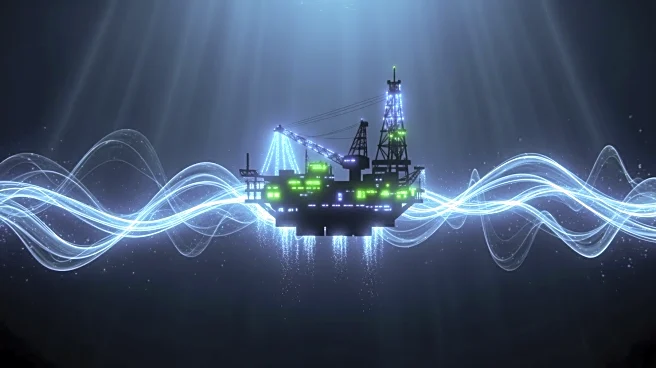What's Happening?
A recent study suggests that using hydrogen plasma could make deep-sea mining more sustainable by reducing the carbon footprint associated with metal extraction. The process involves using hydrogen and argon gas in an arc furnace to extract metals from
polymetallic nodules found on the ocean floor. These nodules contain valuable metals like manganese, nickel, copper, and cobalt, which are essential for the production of solar power and electric vehicles. The study highlights that if the hydrogen used is 'green'—produced from renewable sources—and the electricity for the furnace is also renewable, the process could potentially emit no carbon dioxide. This method contrasts with traditional land-based mining, which often involves environmentally damaging practices.
Why It's Important?
The development of a more sustainable method for deep-sea mining is significant due to the increasing demand for metals used in renewable energy technologies. As the world shifts towards greener energy solutions, the need for metals like those found in polymetallic nodules is expected to rise. However, deep-sea mining is controversial due to its potential impact on fragile marine ecosystems. The proposed hydrogen plasma method could offer a way to meet metal demands while minimizing environmental harm. This could influence future policies and regulations regarding resource extraction from the ocean floor, balancing economic interests with ecological preservation.
What's Next?
The study's findings could prompt further research into the feasibility and environmental impact of hydrogen plasma in deep-sea mining. Stakeholders, including environmental groups, governments, and mining companies, may engage in discussions to evaluate the potential adoption of this technology. Regulatory bodies might consider setting guidelines to ensure that any future deep-sea mining operations adhere to sustainable practices. Additionally, the development of infrastructure for producing green hydrogen and renewable electricity will be crucial for implementing this method on a large scale.
Beyond the Headlines
The introduction of hydrogen plasma in deep-sea mining raises ethical and legal questions about the exploitation of ocean resources. There is a need to balance technological advancement with the protection of marine biodiversity. The potential economic benefits must be weighed against the long-term ecological consequences. This development could also influence international agreements on ocean resource management, as countries navigate the complexities of shared marine environments.















